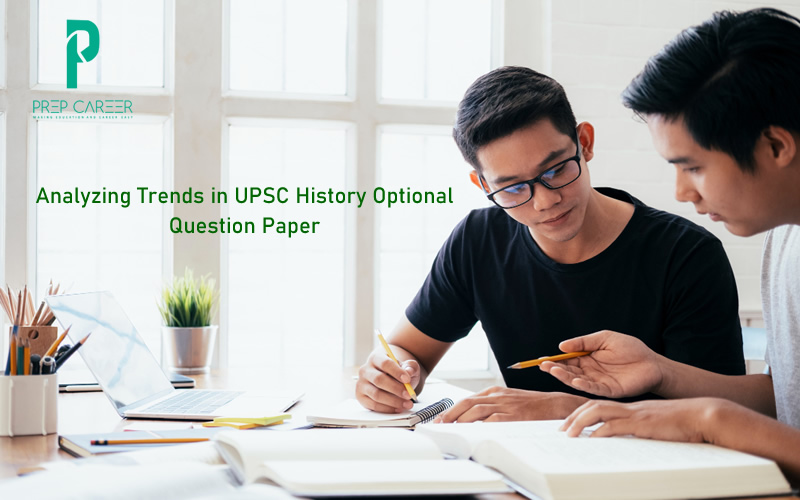
Analyzing the Trends in UPSC History Optional Question Paper over the Last 5 Years
Analyzing the trends in the UPSC History Optional question paper over the last five years can provide valuable insights into the types of questions that are being asked and help you prepare more effectively for the exam.
Here are some trends that have been observed in the UPSC History Optional question paper over the last five years:
Increased Emphasis on Conceptual Understanding:
The UPSC History Optional exam has always been known for testing the conceptual understanding of the candidates. However, in recent years, there has been an increased emphasis on this aspect of the exam. The question paper has become more focused on testing the candidates' ability to analyze, interpret and apply their knowledge of historical events, personalities, and concepts.
To prepare for this trend, candidates must focus on developing a deeper understanding of the subject matter. Rather than simply memorizing facts and dates, candidates must focus on the broader historical context and the causes and consequences of historical events.
Candidates should also be prepared to analyze and interpret primary sources, such as historical texts, artifacts, and documents. This requires an understanding of the different methods of historical analysis, such as social, economic, cultural, and political analysis.
To prepare for this increased emphasis on conceptual understanding, candidates should:
- 1. Read widely on the subject matter: Candidates should read books, journals, and research papers on the different periods and themes in history. This will help them develop a broader and deeper understanding of the subject matter.
- 2. Develop critical thinking skills: Candidates should practice analyzing and interpreting historical events and concepts critically. This involves looking at multiple perspectives and sources and evaluating the strengths and weaknesses of each.
- 3. Practice answering analytical questions: Candidates should practice answering analytical questions that require them to apply their knowledge of historical events, personalities, and concepts. This will help them develop the necessary skills to analyze and interpret historical events and concepts.
By focusing on developing a deeper understanding of the subject matter, candidates can prepare effectively for the UPSC History Optional exam and succeed in the increased emphasis on conceptual understanding in the question paper.
Inclusion of More Current Affairs:
In recent years, the UPSC History Optional question paper has included more questions on current affairs and contemporary issues. This trend reflects the importance of understanding the historical context of current events and the role of history in shaping the present.
To prepare for this trend, candidates should focus on the intersection of history and current affairs. This involves understanding the historical context of current events and how historical events have influenced the present.
Candidates should be aware of current affairs related to the themes and periods in history that they are studying. For example, if a candidate is studying modern Indian history, they should be aware of contemporary political and social issues in India, such as the rise of Hindu nationalism, the impact of economic liberalization, and the role of social media in politics.
Candidates should also be prepared to answer questions that require them to analyze and interpret the impact of historical events on the present. For example, a question on the impact of the partition of India might require candidates to discuss its implications for contemporary India and Pakistan.
To prepare for the inclusion of more current affairs in the UPSC History Optional question paper, candidates should:
- 1. Keep up-to-date with current affairs: Candidates should read newspapers, magazines, and online sources to stay informed about current events related to the themes and periods in history that they are studying.
- 2. Develop an understanding of the historical context of current affairs: Candidates should develop an understanding of how historical events have influenced current affairs and how current affairs are shaped by historical events.
- 3. Practice answering questions that require an analysis of current affairs: Candidates should practice answering questions that require them to analyze and interpret the impact of historical events on current affairs.
By preparing for the inclusion of more current affairs in the UPSC History Optional question paper, candidates can improve their chances of success in the exam.
Greater Focus on Non-Western History:
Over the past few years, the UPSC History Optional question paper has shown a greater focus on non-Western history. This shift reflects the growing recognition of the importance of non-Western history and the need to broaden the scope of historical study beyond the traditional Eurocentric approach.
To prepare for this trend, candidates must have a good understanding of non-Western history. This includes studying the histories of Asia, Africa, and the Middle East, among other regions. Candidates must also be familiar with the cultural, social, and economic systems of non-Western societies, as well as their historical developments and contributions to world history.
To prepare for this trend, candidates should
- 1. Read widely on non-Western history: Candidates should read books and articles on the history of different regions of the world, including Asia, Africa, and the Middle East.
- 2. Study the cultural, social, and economic systems of non-Western societies: Candidates should study the cultural, social, and economic systems of non-Western societies to develop a deeper understanding of the historical developments and contributions of these societies to world history.
- 3. Practice answering questions on non-Western history: Candidates should practice answering questions on non-Western history to become more familiar with the question format and develop the necessary skills to analyze and interpret historical events and concepts.
By preparing for the greater focus on non-Western history in the UPSC History Optional question paper, candidates can improve their chances of success in the exam and demonstrate their knowledge of the full scope of world history.
Interdisciplinary Approach:
In recent years, the UPSC History Optional question paper has shown an increased focus on an interdisciplinary approach to historical study. This trend reflects the growing recognition of the interconnection between history and other disciplines, such as political science, economics, sociology, and anthropology.
To prepare for this trend, candidates must have a good understanding of the interdisciplinary nature of historical study. Candidates should be familiar with the methods and theories of other disciplines and understand how they can be applied to historical study. Candidates must also be able to demonstrate the ability to integrate knowledge from different disciplines to analyze and interpret historical events and concepts.
To prepare for this trend, candidates should:
- 1. Read widely in other disciplines: Candidates should read books and articles in disciplines such as political science, economics, sociology, and anthropology to develop a better understanding of the methods and theories of other disciplines.
- 2. Develop the ability to integrate knowledge from different disciplines: Candidates should practice integrating knowledge from different disciplines to analyze and interpret historical events and concepts. This will require them to draw connections between historical events and other factors, such as political, social, and economic systems.
- 3. Practice answering interdisciplinary questions: Candidates should practice answering questions that require an interdisciplinary approach to historical study. These questions may require them to draw on knowledge from multiple disciplines to analyze and interpret historical events and concepts.
By preparing for the interdisciplinary approach in the UPSC History Optional question paper, candidates can improve their chances of success in the exam and demonstrate their ability to integrate knowledge from different disciplines to analyze and interpret historical events and concepts.
More Analytical Questions:
Over the last few years, the UPSC History Optional question paper has shown an increased emphasis on analytical questions. This trend reflects the need to test candidates' ability to analyze and interpret historical events and concepts, rather than just recall information.
To prepare for this trend, candidates must develop strong analytical skills. Candidates must be able to identify key themes and patterns, draw connections between different events, and analyze the causes and effects of historical events.
To prepare for this trend, candidates should:
- 1. Read and analyze primary sources: Candidates should read and analyze primary sources to develop the skills necessary to identify key themes and patterns in historical events. Primary sources may include texts, documents, and artifacts.
- 2. Practice analyzing historical events: Candidates should practice analyzing historical events to develop the skills necessary to draw connections between different events and analyze their causes and effects. This will require them to think critically and develop their own arguments.
- 3. Practice answering analytical questions: Candidates should practice answering analytical questions to become more familiar with the question format and develop the necessary skills to analyze and interpret historical events and concepts.
By preparing for the increased emphasis on analytical questions in the UPSC History Optional question paper, candidates can improve their chances of success in the exam and demonstrate their ability to analyze and interpret historical events and concepts.
Balanced Coverage:
Balanced coverage is an important trend in the UPSC History Optional question paper over the past few years. This trend reflects the need for candidates to have a well-rounded understanding of world history, including the political, economic, social, and cultural aspects of different societies.
To prepare for this trend, candidates must study a diverse range of historical events and concepts, from different regions of the world, and from different time periods. Candidates must also be able to demonstrate their understanding of the connections and relationships between different events and concepts.
To prepare for this trend, candidates should:
- 1. Study a diverse range of historical events and concepts: Candidates should study events and concepts from different regions of the world and from different time periods. This will help them develop a more well-rounded understanding of world history.
- 2. Understand the connections and relationships between different events and concepts: Candidates should be able to identify connections and relationships between different events and concepts. This will help them develop a more nuanced understanding of world history.
- 3. Practice answering questions on a diverse range of historical events and concepts: Candidates should practice answering questions on a diverse range of historical events and concepts to become more familiar with the question format and develop the necessary skills to analyze and interpret historical events and concepts.
By preparing for the trend of balanced coverage in the UPSC History Optional question paper, candidates can improve their chances of success in the exam and demonstrate their understanding of the political, economic, social, and cultural aspects of different societies and regions throughout world history.
By analyzing the trends in the UPSC History Optional question paper over the last five years, candidates can prepare more effectively for the exam by focusing on the key areas and types of questions that are likely to be asked.
-1703874678262.png)
